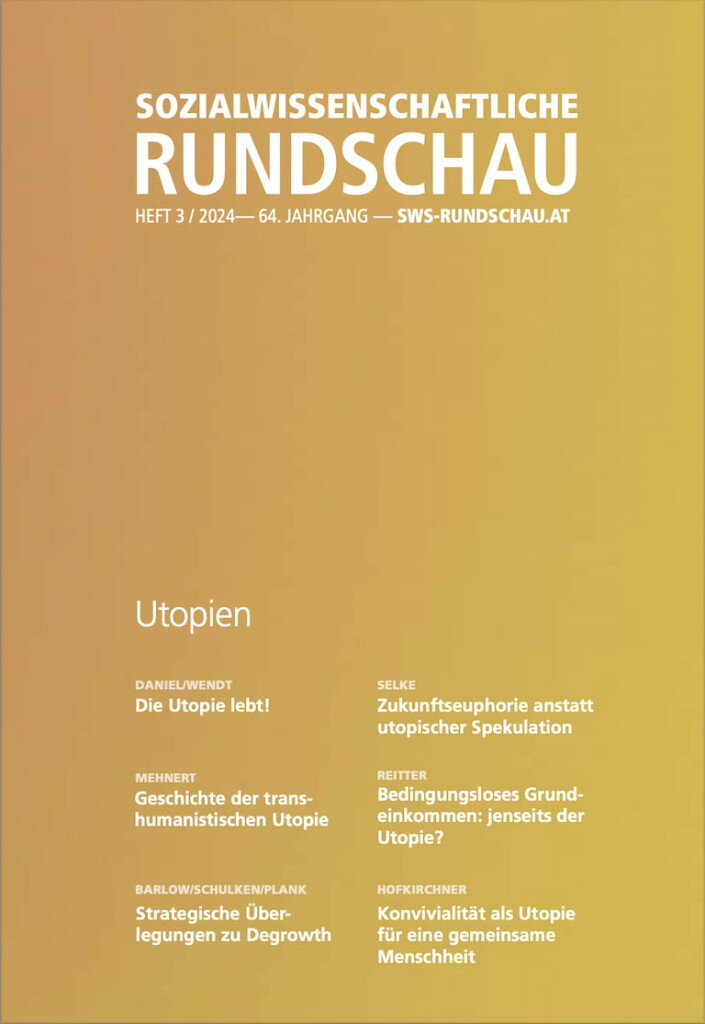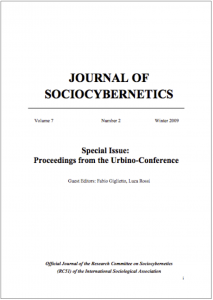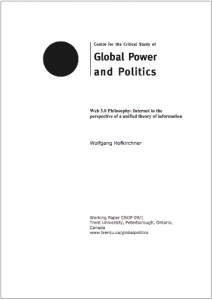peer-reviewed journal articles
1 Complexity Thinking | 2 Science of Information | 3 ICTs and Society
1 Complexity Thinking | top
::
(2024) Konvivialität als Utopie für eine gemeinsame Menschheit. In: SWS-Rundschau, 3, 2024, 301-313.
::
(2020) A paradigm shift for the Great Bifurcation. In: Special Issue: Evolutionary dynamics of social systems, BioSystems, 197, Nov. 2020, (1-7). https://doi.org/10.1016/j.biosystems.2020.104193
::
::
::
(2017) Transdisciplinarity needs Systemism. In: Minati. G., Pessa, E., Licata, I. (eds.), Second Generation General System Theory: Perspectives in Philosophy and Approaches in Complex Systems, Special Issue, Systems, 5, 15, 1-11. DOI:10.3390/systems5010015
(2017) In: Minati, G., Pessa, E., Licata, I. (eds.), Second Generation General System Theory: Perspectives in Philosophy and Approaches in Complex Systems, MDPI Books, Basel, 57-67
::
::
(2009) The Topos of Virtuality. In: triple-c, vol. 7, no. 1, 74-87 [co-author Zimmermann, R.E.]
::
::
::
::
(2004) Unity Through Diversity. Dialectics – Systems Thinking – Semiotics. In: Trans 15(ISSN 1560-182X), http://www.inst.at/trans/15Nr/01_2/hofkirchner15.htm
::
(2004) A New Way of Thinking and a New World View. On the Philosophy of Self-Organisation I. In: Cybernetics & Human Knowing, Vol. 11/No. 1, 63–78
::
(2003) Zhyttia u sviti samoorganizatsyii: zmagannia styliv myslennia ta svitobachen’ [Living in a World of Self-Organisation: Ways of Thinking and World Views Contested – Ukrainian]. In: Practychna Filosofiya 1(7), 39–48
::
(2002) Postfordistische Globalisiserung. In: Z 50, 152–165 [Postfordist globalisation] [co-author Fuchs, C.]
(2002) Globalisierung – ein allgemeiner Prozess der Menschheitsgeschichte. In: Z 49, 89–102 [Globalisation – a universal process of human history] [co-author Fuchs, C.]
(2001) Theorien der Globalisierung. Über ein sowohl neues als auch altbekanntes Phänomen des Kapitalismus und der Menschheitsgeschichte. In: Z 48, 21–34 [Theories of globalisation. On a new but at the same time well-known phenomenon of capitalism and human history] [co-author Fuchs, C.]
(1993) Groping for the Next Stage of Civilization. Philosophical Reflections on the Concept of Sustainability. In: Peace and the Sciences XXIV/Dec., 48–55 [co-authors Fleissner, P., D. Dimitrov]
(1993) Vom Homo oeconomicus zur Natura “Domina”? Perspektiven einer Umweltpolitik jenseits von Ökonomismus und Ökologismus. In: Kurswechsel 4, 93–109 [From homo oeconomicus to natura “domina”? Perspectives of environmental policy beyond economism and ecologism]
(1993) Zwischen Chaos und Versklavung. Die Entgrenzung der Naturwissenschaften und die Mauern im Kopf. In: Fortschrittliche Wissenschaft 37, 7–18 [Between chaos and enslavement. Transcendence in science and the bulkheads in the heads]
(1991) Freiheit und Verantwortung in der Wissenschaft. In: der freidenker 2, 4–7 [Freedom and responsibility in science]
(1989) “Regulierungskrisen” – im Westen oder im Osten? In: Kurswechsel 4, 53–72 [“Crises in regulation” – in the West or in the East?] [co-author Fleissner, P.]
(1989) Reform oder Klassenkampf? In: Forum 428–429, 16–28 [Reform or class struggle?] [co-author Fleissner, P.]
2 Science of Information | top
::
(2019) glossaLAB: Co-creating Interdisciplinary Knowledge. In: Communications in Computer and Information Science, 1051, 423-437, https://doi.org/10.1007/978-3-030-32475-9_31 [co-authors Díaz-Nafría, J., Guarda, T., Burgin, M., Zimmermann, R. E., Chroust, G., Belli, S.]
::
::
(2011) Four ways of thinking in information. In: triple-c, vol. 9, no. 2, Special issue on “Towards a New Science of Information”, 322-331
::
(2011) Toward a New Science of Information. In: Information, vol. 2, no. 2, Special Issue Selected Papers from FIS 2010 Beijing, 372-382, http://www.mdpi.com/2078-2489/2/2/372/
::
(2011) Floridi’s “Open Problems in Philosophy of Information”, Ten Years Later. In: Information, vol. 2, no. 2, 327-359, http://www.mdpi.com/2078-2489/2/2/327/ [co-author Dodig-Crnkovic, G.]
::
::
(2005) Biological Information. Sign Processes in Living Systems. In: Journal of Biosemiotics 2, Vol. 1, 391-405 [co-author Ellersdorfer, G.]
::
::
::
(2002) The Status of Biosemiotics. In: SEED Vol. 2/No. 3, 4–15
(1997) Actio non est reactio. An Extension of the Concept of Causality towards Phenomena of Information. In: World Futures 3–4(49) & 1–4(50), 409–427 [co-author Fleissner, P.]
(1997) Is a Unified Theory of Information Feasible? In: World Futures 3–4(49) & 1–4(50), 213–234 [co-authors Capurro, R., P. Fleissner]. Also in: Informatik Forum 1/1997, 36–45
(1996) Emergent Information. Towards a unified information theory. In: BioSystems 2-3(38), 243–248 [co-author Fleissner, P.]
(1995) In-formatio revisited. Wider den dinglichen Informationsbegriff. In: Informatik Forum 3, 126–131 [In-formatio revisited. Against an objectifying information concept] [co-author Fleissner, P.]
(1995) “Information Science”: An Idea Whose Time Has Come. In: Informatik Forum 3, 99–106
3 ICTs and Society | top
::
(2010) How to Design the Infosphere: the Fourth Revolution, the Management of the Life Cycle of Information, and Information Ethics as a Macroethics. In: Knowledge, Technology and Policy, Special Issue, Vol. 23, Issue 1-2, 177-192; online: http://www.springerlink.com/content/kp1575u71031p68h/
::
::
::
::
(2009) Web 3.0 Philosophy: Internet in the perspective of a unified theory of information. In: Practychna Filosofiya 1(31), 128-133.
Also in: Working Paper CSGP 09/1, Centre for the Critical Study of Global Power and Politics, Trent University, Peterborough, Ontario, Canada, http://www.trentu.ca/globalpolitics/documents/Hofkirchner091.pdf, 14
::
::
::
::
(2004) The Ethos of the Great Bifurcation. In: IRIE, Vol. 2, Nov. [co-author Maier-Rabler, U.]
::
(1998) The Making Of The Information Society: Driving Forces, „Leitbilder“ And The Imperative For Survival. In: BioSystems 46, 201–207 [co-author Fleissner, P.]
(1994) Gestaltungs- und Wirkungsforschung: Eine neue Disziplin? In: Soziale Technik 1, 10–11 [Design and assessment of technology: a new discipline?]
(1991) Exempel Golfkrieg – Wird die These von der zunehmenden Unführbarkeit von Kriegen widerlegt? Eine interaktive multimediale Dokumentation als computergestützte militärische Technikfolgenabschätzung. In: Informationsdienst Wissenschaft und Frieden 3, 45–46 [Does the Gulf War falsify the asumption of growing unwageability of wars?] [co-author Purgathofer, P.]
(1990) Ist unsere Zivilisation strukturell kriegsunfähig? In: dialog 3–4, 229–232 [Is civilisation structurally unable to wage war?] [co-authors Fürstenhofer, N., Gustenau, G. E.]
(1990) Konventionelle Kriegsfolgen in der “Informationsgesellschaft”. Bemerkungen zur Inkompatibilität von Militär und Zivilisation. In: Informatikforum 3, 161–165 [Consequences of conventional war in “information society”. Annotations on the incompatibility of miltary and civilisation]
(1990) Wandel der Technik – Wandel der Arbeitsweise, Einige Erfahrungen aus Österreich. In: Akademie der Wissenschaften der DDR (ed.), Jahrbuch für Soziologie und Sozialpolitik, Sonderheft 1990, Berlin, 172–185 [Change of technology – change of work mode. Experience from Austria] [co-author Fleissner, P.]
(1986) Technologie, Ökonomie, Politik, Ideologie – 13 Thesen zu den Triebkräften des Wettrüstens am Beispiel der US-amerikanischen “Strategic Defense Initiative” (SDI). In: Fortschrittliche Wissenschaft 14, 88–101 [Technology, Economy, Politics, Ideology – 13 theses on the driving forces of the arms race, exemplified by the U.S. SDI]
(1984) Warum sind die Genfer Verhandlungen über Mittelstreckenwaffen gescheitert? In: Wissenschaft und Frieden 2, 30–47 [Why did the Geneva INF Talks fail?]
(1984) Notwendig, überflüssig oder gefährlich? Die militärische Reaktion der Sowjetunion auf die NATO-“Nachrüstung”. In: Blätter für deutsche und internationale Politik 4, 396–409 [Needed, needless or hazardous? The military reaction of the Soviet Union to NATO’s Double-Track Decision] Also in: Weg und Ziel 5/1984, 177–183
(1983) Ist die “Nachrüstung” notwendig? Eine kritische Analyse des NATO-Arguments. In: Fortschrittliche Wissenschaft 11, 47–75 [Is “Nachrüstung“ justified? A critical analysis of NATO’s argument]
::







